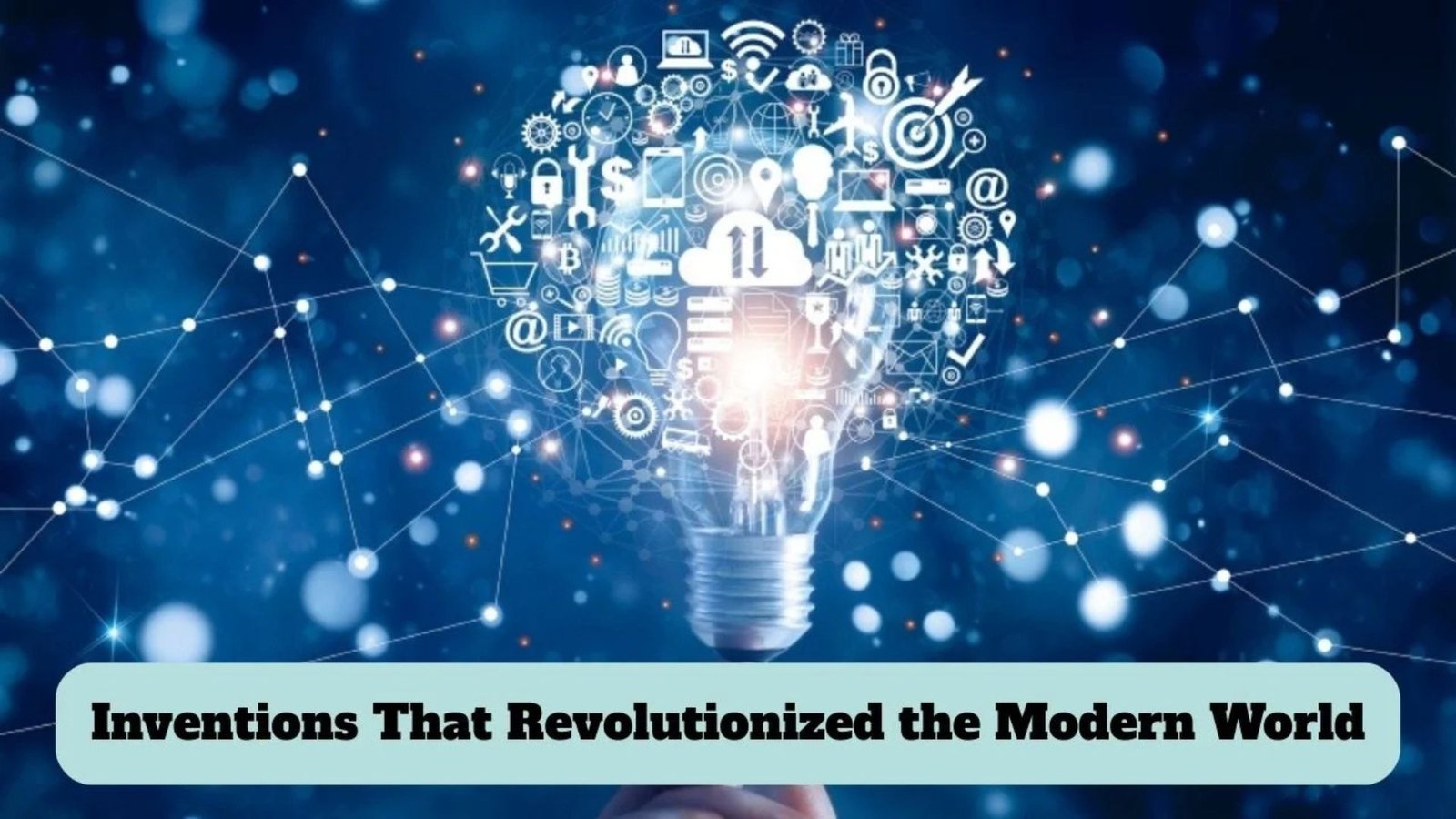The world we live in today is shaped by incredible inventions that have transformed how we live, work, and connect. These groundbreaking creations have made life easier, faster, and more exciting. From the internet to electricity, these inventions have left a lasting impact on society. In this article, we’ll explore the most influential inventions that revolutionized the modern world, explaining them in simple terms and highlighting their importance. Get ready to dive into the fascinating stories behind these game-changers!
Why These Inventions Matter
Inventions are the backbone of progress. They solve problems, improve lives, and open new possibilities. The inventions we’ll discuss here didn’t just change one thing—they reshaped entire industries, economies, and cultures. Whether it’s how we communicate or how we travel, these creations have made the world more connected and efficient. Let’s explore the top inventions that have defined the modern era.
Top 10 Revolutionary Inventions That Shaped Our World
Below is a list of inventions that have had a massive impact on humanity. Each one has a unique story and has changed the way we live.
1. The Internet: Connecting the World
The internet is arguably the most transformative invention of all time. It’s a global network that lets people share information instantly, no matter where they are. From sending emails to streaming movies, the internet has changed how we communicate, work, and have fun.
How It Changed the World
- Communication: Emails, video calls, and social media have replaced slow letters and expensive phone calls.
- Access to Information: Websites like Wikipedia and Google let anyone learn about anything in seconds.
- Business: Online shopping and digital marketing have created new ways to buy and sell.
The internet started as a small project in the 1960s for military communication but grew into a global tool by the 1990s. Today, over 5 billion people use it daily!
2. Electricity: Powering Modern Life
Electricity is the invisible force that powers our homes, gadgets, and industries. Without this invention, modern life would grind to a halt. It all began with pioneers like Thomas Edison and Nikola Tesla, who made electricity usable for everyone.
Why It’s Revolutionary
- Lighting: Electric lights replaced dangerous candles and gas lamps.
- Appliances: From refrigerators to washing machines, electricity made household tasks easier.
- Industry: Factories became faster and more efficient with electric machines.
Electricity transformed the world by making it possible to work and live comfortably at any time of day or night.
3. The Telephone: Instant Voice Connection
The telephone, invented by Alexander Graham Bell in 1876, was a game-changer. It allowed people to talk to each other across long distances, something unthinkable before.
Impact on Society
- Personal Connection: Families and friends could stay in touch, no matter the distance.
- Business Growth: Companies could coordinate faster and expand globally.
- Emergency Services: Quick calls to police or doctors saved countless lives.
Today’s smartphones are an advanced version of this invention, combining calls, texts, and apps in one device.
4. The Automobile: Freedom on Wheels
The automobile, pioneered by Karl Benz in 1885, gave people the freedom to travel wherever and whenever they wanted. Cars replaced horse-drawn carriages and changed how we move.
How Cars Changed Lives
- Travel: People could explore new places easily.
- Economy: The auto industry created millions of jobs.
- Cities: Suburbs grew as people could live farther from work.
Modern electric cars are now taking this invention to the next level by being eco-friendly.
5. The Computer: The Brain of the Digital Age
Computers have transformed every aspect of life since their rise in the mid-20th century. From room-sized machines to sleek laptops, this invention powers everything from science to entertainment.
Key Impacts
- Work: Computers made tasks like writing, calculating, and designing faster.
- Innovation: They enabled advancements in medicine, engineering, and more.
- Entertainment: Video games, movies, and music rely on computers.
The personal computer, introduced by companies like Apple and IBM, made this invention accessible to everyone.
6. Antibiotics: Saving Lives with Medicine
Antibiotics, discovered by Alexander Fleming in 1928, are medicines that fight bacterial infections. Before this invention, simple infections could be deadly.
Why It’s a Game-Changer
- Health: Antibiotics have saved millions of lives from diseases like pneumonia.
- Surgery: They made operations safer by preventing infections.
- Longer Lives: People live longer because infections are treatable.
This invention laid the foundation for modern medicine and continues to save lives.
7. The Steam Engine: The Start of Industry
The steam engine, developed in the 1700s by James Watt, was the spark that started the Industrial Revolution. It powered machines, trains, and ships, changing how goods were made and moved.
Its Lasting Effects
- Factories: Machines replaced handwork, making goods cheaper and faster.
- Transportation: Steam trains and ships connected the world.
- Jobs: New industries created millions of jobs.
This invention paved the way for modern machines and transportation.
8. The Printing Press: Spreading Knowledge
Invented by Johannes Gutenberg around 1440, the printing press made books affordable and widely available. Before this invention, books were copied by hand and were rare.
Why It Matters
- Education: More people learned to read and write.
- Science: Ideas spread quickly, fueling discoveries.
- Culture: Stories, art, and knowledge reached more people.
The printing press laid the groundwork for the internet by making information accessible to all.
9. The Airplane: Conquering the Skies
The Wright brothers’ first flight in 1903 marked the birth of the airplane. This invention made travel faster and connected the world like never before.
How It Changed the World
- Travel: Trips that took weeks by ship now take hours.
- Global Trade: Goods can be shipped quickly across continents.
- Culture: People can experience new countries and cultures easily.
Airplanes have made the world feel smaller and more connected.
10. The Light Bulb: Brightening Our Lives
Thomas Edison’s light bulb, perfected in 1879, brought safe, reliable light to homes and streets. This invention extended the day and improved safety.
Key Benefits
- Productivity: People could work and study at night.
- Safety: Electric lights were safer than candles or gas lamps.
- Lifestyle: Bright homes improved quality of life.
Modern LED bulbs are an eco-friendly evolution of this invention.
Impact of Revolutionary Inventions
| Invention | Year | Key Impact | Modern Example |
|---|---|---|---|
| Internet | 1960s | Global communication and information access | Social media, streaming |
| Electricity | 1800s | Powers homes, industries, and devices | Smart homes, electric cars |
| Telephone | 1876 | Instant voice communication | Smartphones |
| Automobile | 1885 | Freedom of movement | Electric vehicles |
| Computer | 1940s | Digital work and innovation | Laptops, AI systems |
| Antibiotics | 1928 | Life-saving infection treatment | Modern medicine |
| Steam Engine | 1700s | Industrial growth and transportation | Modern trains |
| Printing Press | 1440 | Spread of knowledge | E-books, online articles |
| Airplane | 1903 | Fast global travel | Commercial jets |
| Light Bulb | 1879 | Safe, reliable lighting | LED bulbs |
How These Inventions Work Together
These inventions didn’t just change the world on their own—they built on each other. For example:
- The steam engine powered early factories, which made parts for cars and planes.
- Electricity made computers and the internet possible.
- The printing press spread knowledge, leading to more scientific discoveries like antibiotics.
Together, these inventions created a cycle of progress, each one making the next possible.
The Future of Inventions
The story of inventions doesn’t end here. Today, new technologies like artificial intelligence (AI), renewable energy, and space exploration are building on these foundations. For example:
- AI: Computers are getting smarter, helping with everything from medicine to driving.
- Green Energy: Solar and wind power are making electricity cleaner.
- Space Travel: Rockets are taking us closer to exploring other planets.
These future inventions will continue to shape the world, just as the ones before them did.
Why Understanding Inventions Is Important
Learning about these inventions helps us appreciate how far we’ve come. It also inspires us to keep creating and solving problems. Every invention started with someone asking, “What if?” By understanding their impact, we can dream up the next big thing.
Conclusion
The inventions we’ve explored—the internet, electricity, telephones, cars, computers, antibiotics, steam engines, printing presses, airplanes, and light bulbs—have transformed our world. They’ve made life faster, safer, and more connected. By understanding their stories, we see how human creativity and science can change history. What’s the next invention that will revolutionize our lives? Only time will tell, but one thing is clear: the spirit of innovation will keep driving us forward.




